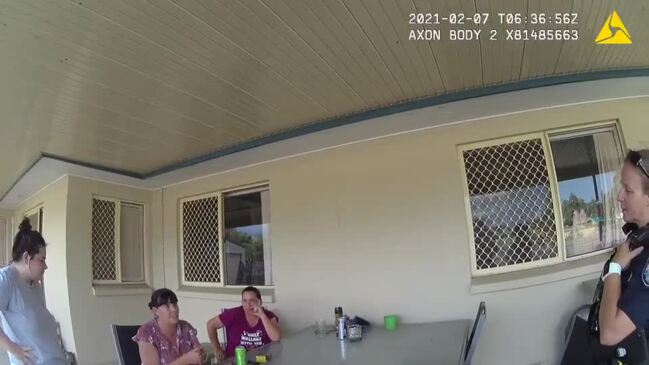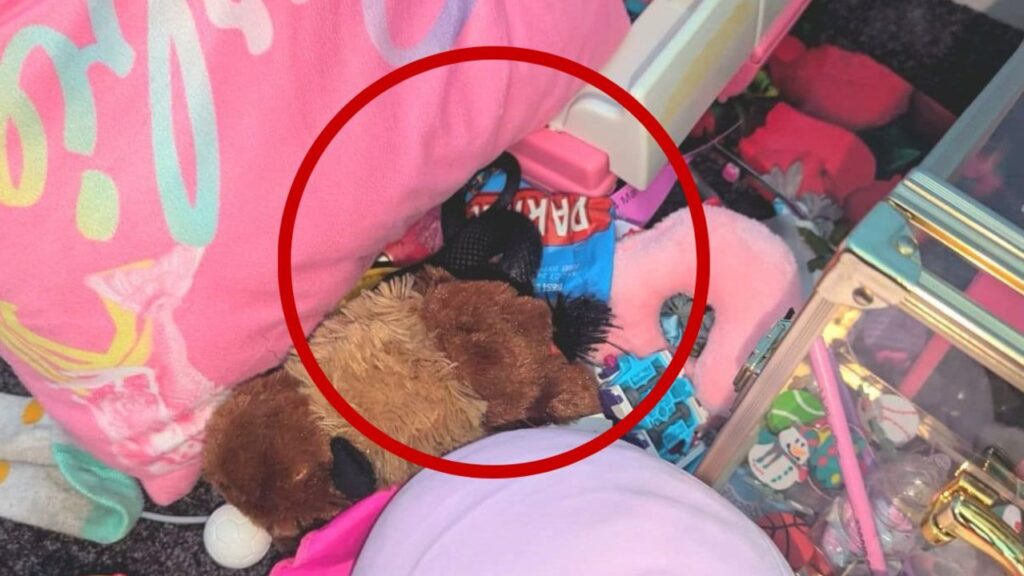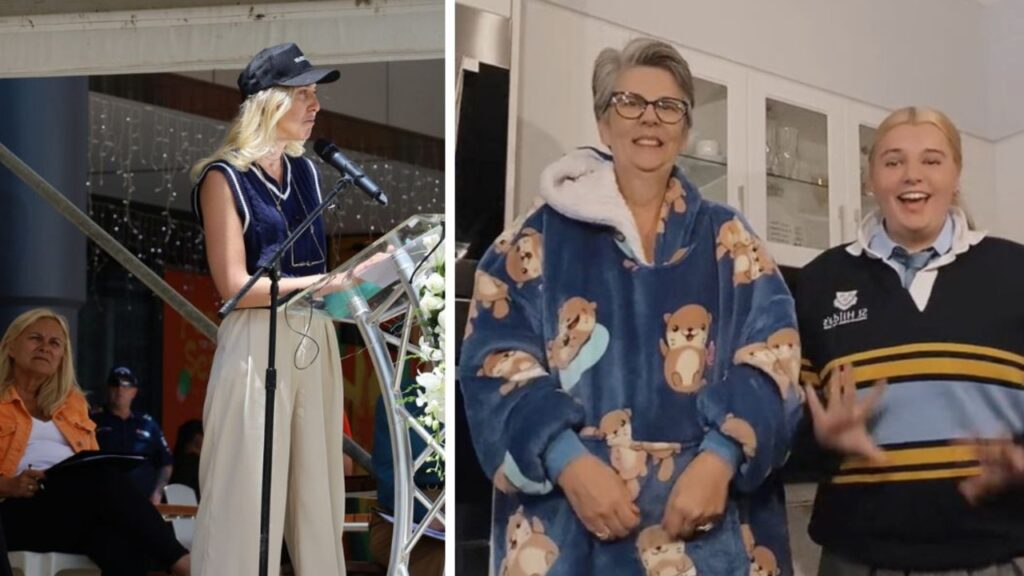Police body cam footage exposes the shocking repeated failures that ultimately cost a woman her life
Written by admin on October 24, 2024
Vision of her frightened mother crying as she pleaded for help from cold and dismissive police will haunt Tabitha Bleys for the rest of her life.
The footage from an officer’s body camera footage shows the disturbing interaction that took place less than a week before Doreen Langham was murdered by her abusive former partner when he set her Brisbane townhouse on fire.
“Seeing the body camera footage, that was really hard,” Ms Bleys told news.com.au.
“It took away the last image I had of my mum, us together at my niece’s dance class. In the footage, she’s clearly quite nervous. The way she was holding onto her body, she was dropping things … that’s now the picture in my head.”
The visit to her home by Queensland Police on February 7, 2021 was one of dozens of interactions Ms Langham had with authorities about the violent and dangerous escalation in Gary Hely’s behaviour, none of which were taken seriously or acted on.
During an inquest into Ms Langham’s murder, the coroner found some officers felt she didn’t seem that scared while others failed to carry out even basic duties to assess the level of harm she faced.
One even said that it merely seemed as though her abusive former partner was trying to win her back via acts of “love”.
The footage, released during the inquest, shows the teary 49-year-old nervously recounting the terrifying stalking she was being subjected to.
“This is the fourth time he’s been here since he’s been served [with a domestic violence order],” she told them, adding she’d been to three police stations in two days.
“He was here for 40 minutes on Sunday night. I found a rose on my back table, my front door was unlocked,” she said.
“I’ve had all my locks changed, bolts put on, changed my rego, changed my phone number, which he’s now got.
“I just want my life back, I want to feel safe, I want to go to work. I’m over crying.”
No action was taken, despite Hely having clearly breached a domestic violence protection order that was in place.
In all interactions, the coroner found Ms Langham wasn’t taken seriously by police.
On February 21 at 9.21pm, she phoned triple-0 after hearing a noise in her backyard and seeing a person’s shadow. It was four hours until two officers showed up, knocked on the front door, waited 40 seconds, and then left again.
Emergency services returned to the property less than three hours later after neighbours heard screams and glass breaking, before seeing flames coming from inside Ms Langham’s home.
Fire crews were on the scene just after 4am. It took half an hour to bring the blaze under control.
“I was at work and I got a call from my sister,” Ms Bleys recalled of the morning that devastated her family.
“She’d just had the police at her door asking if mum was there. She asked when I’d last spoken to her. I hadn’t spoken to her in two days, which is not uncommon. But obviously I then tried to call multiple times. I live about four hours away from mum, so went to the local police station here.
“No one could tell me anything. I sat there for an hour crying, trying to work out what the hell was happening because no-one could say anything.
“I spent the rest of the day waiting, not knowing, until they identified her body. She was dead.”
Shocking repeated failures
Sixteen police officers had contact with Ms Langham in the days before her murder and the inquest heard none of them had adequately assessed the extreme risk she faced.
State coroner Jane Bentley found the officers who dismissed Ms Langham’s fears had not even bothered asking if she was scared.
In all, they had “failed to comply with their duties and obligations”.
“They did not listen to or act on the information she gave them. They did not record that information correctly in the database. They did not put flags on Hely’s or Ms Langham’s names on the database.
“Their inadequate response impacted on decisions made in relation to Ms Langham’s later contacts with police.”
Shockingly, one officer she spoke with concluded that Hely’s behaviour “was normal for a man whose ‘advances of love’ were being rejected”.
Ms Langham started a relationship with Hely in 2018 while living in Western Australia, but the couple moved to Queensland the following year so she could be closer to her grandchildren.
Very early on, Ms Bleys felt something wasn’t right.
“I was actually the one that raised it, that I believed the relationship was not okay. I was the person that first identified it.
“And then I was the one that initiated the conversation with family and friends to say, can you please keep an eye out. While it wasn’t physical at that stage, I was worried. I could see the signs of coercive control.”
He was constantly putting her down. He was jealous and incredibly possessive. He was moody and prone to outburst, especially when he drank.
The couple argued a lot. When they did, he would oftentimes ignore her for days afterwards.
In late 2019, Ms Bleys took her mum shopping and she started to cry, revealing Hely had bitten her on the arm during a disagreement.
The instances of physical violence escalated.
During one attack in April 2020, Hely punched her in the face and kicked her in the back, prompting her to flee to stay with a friend.
They had been engaged, but after that, Ms Langham called off the wedding.
Around that time, a witness later recalled him say he’d rather be dead than live without her.
At the start of 2021, Ms Langham ended the relationship for good and Hely moved out of the Logan townhouse they shared.
By February, he was bombarding her with text messages and phone calls, showing up at her work and home with flowers, and lurking around her property.
Ms Langham went to court and obtained a domestic violence protection order. She changed her phone number and bank account. She had new locks and deadbolts put on her doors.
And yet the stalking continued, with her home broken into several times and CCTV cameras capturing Hely slinking around the complex she lived in.
The inquest heard that she did everything right. She went to police. She got a DVO. She sought assistance from support services.
“Unfortunately, her engagements with her police, when she really needed help, left her unprotected,” Ms Bleys said.
“The officers who told her that they couldn’t support her were wrong. That wasn’t true. There was a lot they could’ve done.”
Former Queensland Assistant Police Commissioner Clem O’Regan provided a report for the inquest, in which he declared that police did “less than the minimum”, describing the outcome as “a great tragedy”.
Doreen should be alive
Despite the worrying behaviour and Hely’s threats that he was going to kill her, police brushed off Ms Langham’s concerns.
She made multiple trips to various police stations and regularly called in reports of him breaching the order meant to protect her.
The inquest heard that one officer suggested she save up those reports and only contact them once a week, rather than daily.
Ms Bently noted: “By the time of Ms Langham’s death, Hely had continually breached the DVO and committed other serious criminal offences, but no police officer considered his offending was significant enough for them to make any real attempt to locate him so that he could be questioned and charged.”
Officers who spoke to Ms Langham felt she didn’t seem fearful for her life, but the inquest noted that none had actually asked her if she was scared.
“There was an insufficient assessment of risk by all police involved,” Ms Bentley said.
“Police took no action in relation to the numerous breaches of the [domestic violence order] committed by Hely. He could have been charged with those and with a stalking offence.
“Police officers failed to take even the most basic steps to investigate Ms Langham’s complaints or ascertain the risk Hely posed to her.”
In the final hours of her life, the coroner found there were multiple missed opportunities for police to protect Ms Langham.
Police who responded to her triple-0 calls some four hours after the fact “failed to fulfil their duties and obligations to investigate the matter and ensure Ms Langham’s safety”.
“They were at her door for 40 seconds during which they knocked once and then quickly left when there was no answer.
“If officers had attended earlier that evening they may have seen Hely walking around the complex. If officers had walked around Ms Langham’s unit they may have seen Hely in the back yard.
“There were therefore missed opportunities to disrupt his plans or provide Ms Langham with assistance, for example, to leave the residence.”
The findings of the inquest were scathing, deeming the response of police inadequate and concluded multiple officers had “failed to protect her and prevent her death”.
“The response she received fell far short of basic expectations.
“It is possible that had every complaint been dealt with in accordance with relevant duties and obligations, Hely would not have killed Ms Langham or himself.”
Ms Bleys and her sister Shayne Probert had been supporting their mother and trying to get her help, so they were aware of the poor interactions she had with police.
“But the inquest put all of it into stark context,” Ms Bleys said.
“I’m very disappointed. I’ve always told my young daughter that she can trust police, the police are here to protect us. But they didn’t protect my mum.
“How can I tell my daughter those things now with any confidence?”
Ms Bleys believes her mother would still be alive if police had done their jobs and the system had worked as it’s meant to.
Instead, her horrific and preventable death has left behind countless heartbroken family members and friends.
“I don’t have a mum my daughter doesn’t have a grandma,” Ms Bleys said
More Coverage
“Every milestone that happens is always overshadowed by the fact that she’s not there. For my daughter, every positive moment, every milestone, is a reminder grandma’s not here to see her. She’s not here to see her start year one, not here to watch her first dance concert.
“What can we do to learn from this, to stop it happening to other families? We’re clearly not learning from the mistakes at the moment.
“We’re putting band-aids on but we’re not actually changing anything, in my opinion.”








